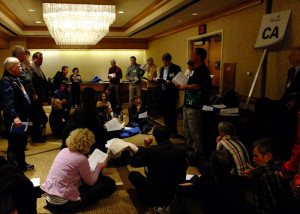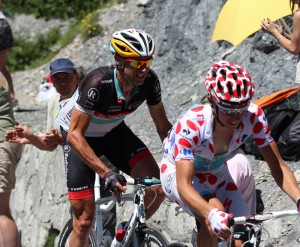Forget everything you read below! After John Burke’s rousing keynote address at TrekWorld, their annual dealer show, Chain Reaction is going to step up to the advocacy plate with an even-bigger commitment than before, adding $1 for every Trek helmet sold, and $10 for every dual-suspension mountain bike, to a fund that goes to People for Bikes, IMBA (mtn bike organization) and the League of American Bicyclists.
It doesn’t matter if it’s “fair” that we should be doing more than others. It’s a job that simply has to get done, and life isn’t about fairness, it’s about doing what’s right and stepping up to the plate when the need arises. As John Burke said, it’s time to double-down and seize the day! But I’m going to leave my original whine intact below, since there are still some valid issues. We’re just not going to let them get in the way of doing the right thing. –Mike–
Sounds like strange bedfellows, lumping Pro-team sponsorship (the top-level teams you see racing in the Tour de France) with advocacy, but bear with me for a moment.
Many companies supplying local bikes shops are spending millions of dollars sponsoring professional cycling teams, and untold millions more on advocacy efforts.

Of course advocacy isn’t an option, it’s an ongoing requirement if we’re to have safe places to ride and a legal counter to the automotive industry’s attempts to legislate us off the roads. But as a tax, it’s imposed on only a part of the industry, paid for by visionary companies and, by extension, dealers who are paying higher prices and seeing lower margins on the bikes they sell. In a very real sense, your local bike shop is subsidizing sales of bikes purchased elsewhere. Inevitable? Is there a way around this? Don’t know. The local dealer is not in a position to do much about it; it’s become a necessary cost of doing business if you believe in bicycles. Even my bringing up this question publicly runs the risk of looking like I’m putting business concerns ahead of the needs of cyclists, which couldn’t be further from the truth. Like a defrocked great cyclist once said, I believe in bikes. Unlike the defrocked great cyclist, I also believe in truth and fairness.
It’s a good question whether on-line and department stores believe in bicycles, or if it’s just short-term business optimization for them. Can we get their help, or do they recognize a good thing when they see it and have no intention of becoming part of an active movement to make cycling better, because somebody else is doing it for them?
The on-line world already benefits from not having the costs of a physical presence where people can touch and feel and try out product; some even encourage their customers to find what they want locally and then buy from them. They’ve also fought to avoid having their customers pay sales tax for the community in which they live, which means local services are suffering because the people who use those services aren’t paying for them. Thus I’m not expecting to see many from the on-line world stepping up to the place to make voluntary contributions to cycling advocacy. It’s not in their DNA.

Regarding pro team sponsorship, I of all people am an odd one to have issues with it, since I’m such a fan of cycling as a sport that I’ve been to the last 11 of 12th Tour de Frances. But that’s obviously not typical, and I can identify two significant downsides to marketing oriented towards racing. First, high-end racers don’t buy their own equipment; it’s given to them by their teams. And aspiring high-end racers, and even wannabes who race, often have a sense of entitlement such that they believe they deserve to buy for less than everyone else. I cannot come up with a rational explanation for this; I used to race myself, and saw a little bit of it, but nothing like I see today. Why should someone who takes up racing as a hobby be subsidized by others? A long way of saying we’re marketing to a group that we’ll never profit from.
It’s cool to hang around top racers. I get that. And they can offer a lot of valuable input for making the product better. I get that too! But they’re not the target audience for bikes that are actually sold off the floor. We need to get a better focus on the customer who actually pays for the cycling experience, especially those who are willing to buy something far above what is needed for basic transportation. Does that mean that you don’t sponsor a pro cycling team? No, but it does require that you make a conscious effort to remember who the paying customers are and market appropriately.
Here’s what I want to see- “You don’t have to be Jens Voigt, ripping apart the competition in the Tour de France, to love this bike. You don’t even have to be in good shape to benefit from its smoother ride, greater efficiency and confident handling. What makes a bike great for the Tour de France translates perfectly to a mere mortal looking for more fun & better performance on a bike.”
My part of the industry is paying a good chunk of change on both advocacy & sponsorship. Is Chain Reaction getting its money’s worth from it? That’s the question. Does our core customer, the enthusiastic cyclist, which comes in all shapes and sizes and capabilities but share a common belief that bikes are great to ride, see the value?
i’m going to work hard to make this the year we put the enthusiast first. –Mike–